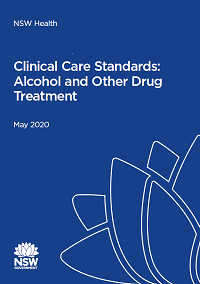Engage with the clinical care standards
The NSW Health Clinical Care Standards for Alcohol and Other Drug Treatment (the Standards) outline the core elements of care that underpin treatment within the alcohol and other drug treatment sector in NSW.
These standards apply to all alcohol and other drug treatment service types and locations and do not identify specific interventions used in treatment. The intention is to detail foundational elements of care, support clinical decision making and complement rather than replicate other sources of information that guide the delivery of high-quality and safe treatment.
Clinical Care Standards: Alcohol and other drug treatment [PDF]
Join the Alcohol and Other Drugs Clinical Care Standards Community Hub
Gain access the library of Clinical Care Standard related resources shared by community of practice members, see resources and activities to assist with integrating the Standards from the Value Based Health Care Program at the NSW Ministry of Health’s Centre for Alcohol and Other Drugs, and catch up on the latest Clinical Care Standards Community of Practice Newsletter. Email MOH-clinicalcarestandards@health.nsw.gov.au
Practice tips
Standard 1: Intake
Practice tips
When we reflect on our intake processes, we come back to the intention, which is to provide a positive experience of a person’s first contact or re-engagement with a service. For the potential client, this is the moment where you can make them feel like a welcomed guest. Whether intake occurs in person, on the phone, is planned or unplanned, the therapeutic fundamentals are the same.
Download practice tips [PDF]
Advocate
Positive experiences [PDF]
Intake is an invitation (page 3)
Frontline
Engage in the art of intake
Standard 2: Comprehensive assessment
Practice tips
The delivery of a comprehensive assessment needs to be respectful, holistic, culturally safe, trauma-informed and provide a positive experience of contact with the AOD sector.
Download practice tips [PDF].
Frontline
Comprehensive assessment
Standard 3: Care planning
Practice tips
The information collected at intake and through the comprehensive assessment contributes to the shaping of the plan of action and steps to be taken during the person’s contact with the service. A trauma-informed care plan is a collaboration between clinician and client. It ensures that the support and interventions being provided match the person’s current circumstance and is responsive to their priority needs.
The care plan, which belongs to the client, is a roadmap of their treatment with identified goals and clearly defined expectations. It ensures that contact is intentional, productive and creates a sense of movement and achievement for the client.
The service setting or system you are working in may dictate the parameters or the steps of the care planning process, but the quality of the experience is an aspect we can shape.
Download practice tips [PDF]
Frontline
Clients in the driver’s seat
Standard 4: Identifying, responding to, and ongoing monitoring of risk
Practice tips
Identifying, responding to, and ongoing monitoring of risk
Assessing and responding to risk is an important part of service delivery. It starts at intake, continues throughout treatment, and at discharge or transfer of care. Our clients are adept at managing risks they encounter every day and the need to build a connection and trust from the outset to enable collaborative treatment is vital.
Download practice tips [PDF]
Advocate
Purpose [PDF]
A relationship with risk (page 17)
Frontline
Identifying, responding to, and ongoing monitoring of risk
Standard 5: Monitoring treatment progress and outcomes
Practice tips
This guide outlines an approach to reviews and monitoring treatment outcomes that is collaborative, strength-based and trauma informed.
Download practice tips [PDF].
Recorded webinars
Beyond outcomes: Tools for better treatment experiences
Using NADAbase outcomes data to inform practice
Standard 6: Transfer of care
Practice tips
The intention of the transfer of care process is to ensure that clients feel supported as they exit from our services. It is followed by documentation written in clear language, that avoids jargon and medicalised terms (unless required) provided to another professional, service, or direct to the client. Transfer of care plans that are co-designed with the client and where planning commences early, are the most effective in providing a smooth transition and positive experience for clients leaving our services; whether their exit is planned or unplanned.
Download practice tips [PDF]
Frontline
Transfer of care planning
